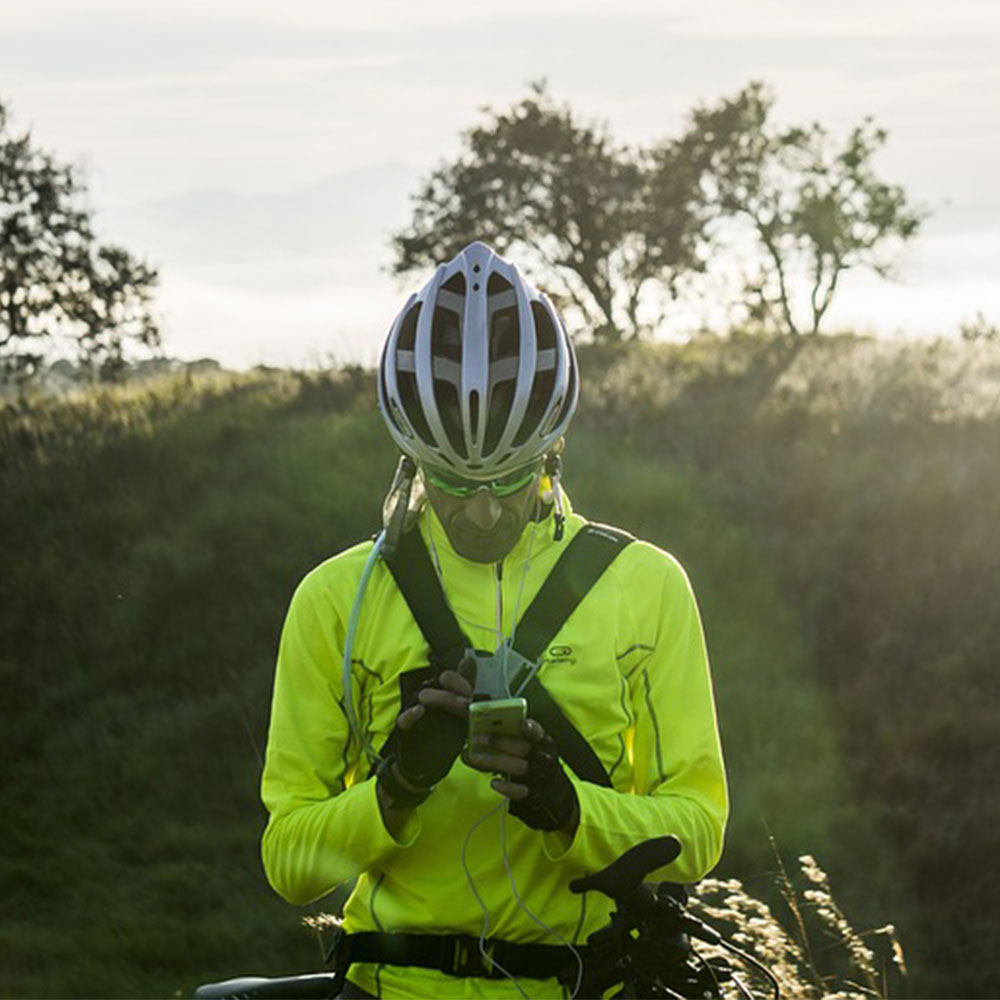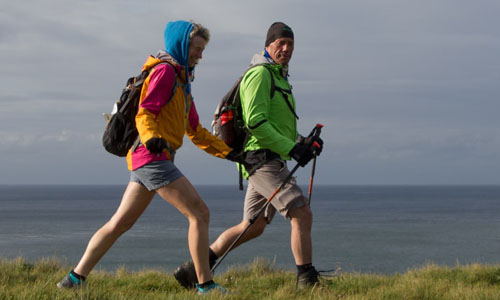Hiking Tips: 7 Foolproof Ways to Save Energy
Author

Chris shares his passion for cycling, hiking, skiing, and climbing from Buxton, in the Peak District. As a blogger for Outdoor Look, Chris shares outdoor tips and indoor tricks to help you get the most out of your time spent outside. When he's not out adventuring he's making videos or trying to keep up with his 4-year-old son.
Love hiking but want to get better at it? It's amazing how an activity can help you with both physical and mental health. Of course, it's not the easiest activity that one can think of, especially if you are planning to go on longer hiking tours. The biggest challenge when improving your hiking is to know how to save your energy levels. Hence, here are some tips to help you keep up.

Hiking Shoes
Sneakers are a big NO when it comes to hiking. Get special shoes that are made exclusively for hiking. They will protect your legs) from injuries. The truth is sneakers may leave cuts on your feet or may not protect you from the rugged terrain. Hiking shoes, on the other hand, are tough and protective. Whether it's hiking sneakers or boots, they will function well in keeping your ankles, feet, and toes safe.
Minimum Baggage
Pack only the essentials you need. You don't have to take with you your entire house. Be very selective with what you want to take. For instance, lightweight carbon pots, lightweight layers, and anything that won't add up to your burden. Avoid taking heavy things because they will only slow you down and take away whatever energy is left in you.
Stay Hydrated
Staying hydrated can not only maintain your energy but also have other beneficial effects like keeping your skin from drying, and keeping your legs and muscles from aching. Don't drink only when you feel thirsty. For your body to function, you need water. Your physical capacity will diminish if your body is not hydrated. So, keep drinking water periodically despite not feeling the thirst throughout the hike.
Eat Well
Ensure that you have a breakfast that does not involve overeating or undereating. Oatmeals are good because they have friendly carbohydrates that will help you preserve your energy. Fruits will enhance natural sugars in your body. Nuts can help you in gaining an adequate amount of protein. And, you won't have to worry about running out of strength halfway through the hike.
Build Endurance through Workout
Working out has many benefits and when you work out constantly, it builds up your endurance which eventually helps in covering longer distances. Constant training will teach your body to survive long distances without losing much energy.
Take Breaks
Last but not the least, your body needs rest to prepare for hiking. You can't expect your body to go through so much without a proper night of sleep. So, give it plenty of sleep before the hiking begins. During the hike, if your legs feel like giving up, give them some rest. A break can do better at times than pushing beyond limits. Let your legs recover so that you can travel some more.

Slow Pace
Walk slowly at first and find a pace to give your leg muscles a warm-up initially. This will also help you with the weight of your backpack. There are several benefits of walking slowly while hiking. Faster walking will tire you out quickly. A slow and sustainable walk will help you preserve the energy and you can do so while enjoying the scenery around you.
Conclusion
Just remember that not all hikes are the same. Some will be a cakewalk while others may have you calling out for God several times before you can complete it. However, these tips are what can help you stay strong in your hikes by preserving your energy.
With these tips, you can begin enjoying your hiking experience.
Author

Chris shares his passion for cycling, hiking, skiing, and climbing from Buxton, in the Peak District. As a blogger for Outdoor Look, Chris shares outdoor tips and indoor tricks to help you get the most out of your time spent outside. When he's not out adventuring he's making videos or trying to keep up with his 4-year-old son.
- Speed Up Your Post-Hike Recovery with These 6 Essential Tips
- Cycling through Tranquil Roads and Coastal Views on the Isle of Wight
- The Essential Guide to Hiking Safety: 5 Tips Every Hiker Should Know
- Run Smart, Run Strong: Your Guide to Injury-Free Running
- Embrace Biking: Essential Tips for Beginners
Categories
- Sport (28)
- Product Reviews (3)
- Team Outdoor Look (7)
- Mike Wild (2)
- Mike Payton (2)
- Suse Hammond-Pears (3)
- Snowboarding (12)
- Latest Offers (105)
- Shop Talk (1)
- Competitions (7)
- Walking (413)
- Lifestyle Fashion (8)
- Travel (86)
- Kit Guides (176)
- Workwear Clothing (6)
- Safety Workwear (4)
- Health/Fitness (289)
- Skiing (91)
- Great Outdoors (1316)
- Cycling (92)
- January 2025
- December 2024
- November 2024
- October 2024
- September 2024
- August 2024
- July 2024
- June 2024
- May 2024
- April 2024
- March 2024
- February 2024
- January 2024
- December 2023
- November 2023
- October 2023
- September 2023
- August 2023
- July 2023
- June 2023
- May 2023
- April 2023
- March 2023
- February 2023
- January 2023
- December 2022
- November 2022
- October 2022
- September 2022
- August 2022
- July 2022
- June 2022
- May 2022
- April 2022
- March 2022
- February 2022
- January 2022
- December 2021
- November 2021
- October 2021
- September 2021
- August 2021
- July 2021
- June 2021
- May 2021
- April 2021
- March 2021
- February 2021
- January 2021
- December 2020
- November 2020
- October 2020
- September 2020
- August 2020
- July 2020
- June 2020
- May 2020
- April 2020
- March 2020
- February 2020
- January 2020
- December 2019
- November 2019
- October 2019
- September 2019
- August 2019
- July 2019
- June 2019
- May 2019
- April 2019
- March 2019
- February 2019
- January 2019
- December 2018
- November 2018
- October 2018
- September 2018
- August 2018
- July 2018
- June 2018
- May 2018
- April 2018
- March 2018
- February 2018
- January 2018
- December 2017
- November 2017
- October 2017
- September 2017
- August 2017
- July 2017
- June 2017
- May 2017
- April 2017
- March 2017
- February 2017
- January 2017
- December 2016
- November 2016
- October 2016
- September 2016
- August 2016
- July 2016
- June 2016
- May 2016
- April 2016
- March 2016
- February 2016
- January 2016
- December 2015
- November 2015
- October 2015
- September 2015
- August 2015
- July 2015
- June 2015
- May 2015
- April 2015
- March 2015
- February 2015
- January 2015
- December 2014
- November 2014
- October 2014
- September 2014
- August 2014
- July 2014
- June 2014
- May 2014
- April 2014
- March 2014
- February 2014
- January 2014
- December 2013
- November 2013
- October 2013
- September 2013
- August 2013
- July 2013
- June 2013
- May 2013
- April 2013
- March 2013
- February 2013
- January 2013
- December 2012
- November 2012
- October 2012
- September 2012
- August 2012
- July 2012
- June 2012
- May 2012
- April 2012
- March 2012
- February 2012
- January 2012
- December 2011
- November 2011
- October 2011
- September 2011
- August 2011
- May 2010
- April 2010
- March 2010
- February 2010
- January 2010
- November 2009
- October 2009
- September 2009


Submit a Comment